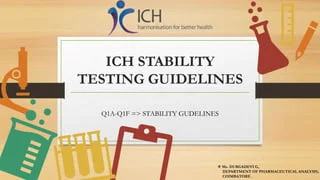Get the essentials of ICH Annex Q stability guidelines. Ensure compliance for your APIs and FPPs. Explore our comprehensive guide and enhance your knowledge!
Active Pharmaceutical Ingredients (APIs) or Finished Pharmaceutical Products (FPPs) stability determines whether they are safe and effective. An application of the ICH Annex 10 Q1F Stability Guideline describes the guidelines followed during the stability testing of APIs and FPPs, hence cross-referencing other ICH guidelines and WHO guidelines. There is another significant aspect of the guideline, risk management in stability testing so that all critical parameters are not neglected.
What is Stability Testing
Stability testing is a series of tests conducted to determine how the quality of an API or FPP might change over time under the conditions of storage. It aims to ensure that the product does not exceed the specified criteria at any point during its shelf life.
What are the requirements for stability testing?
Relevant requirements are as follows for ICH Annex 10 Q1F Stability Guideline.
- The stability testing must be performed on the same product under different conditions like ambient, accelerated, and long-term storage conditions.
- There must be an encouragement of mathematical models for predicting the stability of APIs and FPPs.
The data generated from stability studies are to be regularly reviewed to ensure that the product remains within its specification.
What are the hardships in following these requirements?
There are several issues associated with stability testing compliance. These issues include;
- The cost of stability testing is quite high.
- The process of stability testing is time-consuming.
The process of stability testing can be complex.
How to overcome these issues?
There are several ways to address the compliance issues associated with meeting the requirements for stability testing . These include;
- Utilizing a risk-based approach in stability testing.
- Using mathematical models to forecast the stability of the APIs and FPPs.
- A validated, appropriate, and well-defined protocol for stability testing.
- Qualifications and experience of staff conducting the stability testing
Documentation of all elements of the stability testing process
Conclusion
ICH Annex 10 Q1F Stability Guideline provides a wealth of information to pharmaceutical companies, regulators, and others involved in pharmaceutical product development and registration. Adherence to the guidelines presented will allow these products to remain safe and effective for their intended use over their stated shelf life.
You can contact us at BioBoston Consulting now or visit our website to learn how we can assist you with stability testing.


